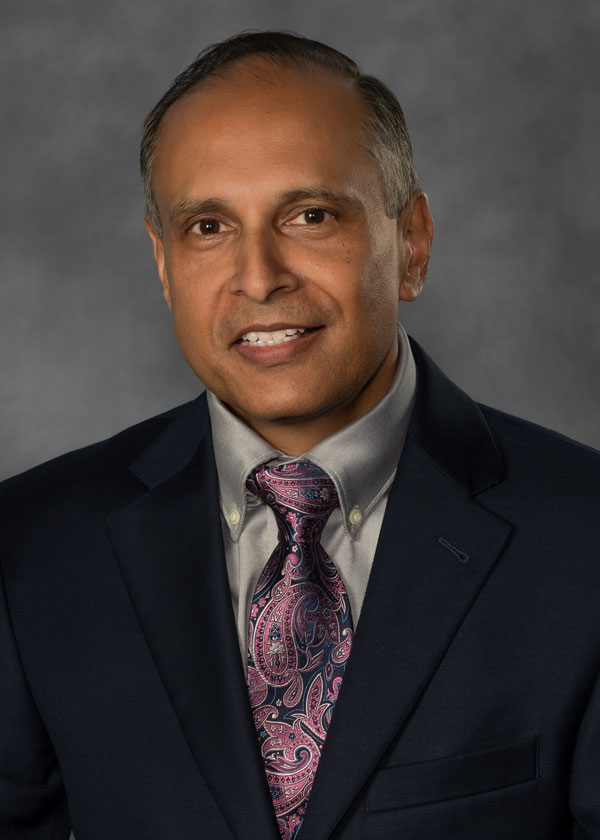Latest News
Research & Innovation
Massey researchers discover new genetic target that could shape the future of liver cancer treatment
Jun 23, 2025
.jpg)
Hepatocellular carcinoma (HCC), the most common type of liver cancer and the third-leading cause of cancer-related deaths worldwide, is extremely challenging to treat. However, the future of HCC patient care looks brighter thanks to research by Devanand Sarkar, M.B.B.S., Ph.D., who discovered that the gene TAF2 plays a pivotal role in the growth of this cancer.
 Pictured: Devanand Sarkar, M.B.B.S., Ph.D.
Pictured: Devanand Sarkar, M.B.B.S., Ph.D.
Sarkar and a team of scientists at VCU Massey Comprehensive Cancer Center found that TAF2 is overexpressed in HCC patients compared to individuals with healthy livers. Through preclinical research, they discovered that TAF2 regulates the survival of hepatocytes—the functional cells of the liver—and tumor formation. Their study—recently published in the journal Hepatology—also demonstrates that TAF2 cooperates with the MYC gene, another known major driver of cancer, to accelerate tumor growth.
With these findings in hand, Sarkar is eager to explore new approaches for treating HCC through the development of new therapies that target TAF2. As the earliest study of TAF2’s role in cancer, this research opens the door to a world of potential in future liver cancer treatment.
“Ours is the first in vivo study to show that TAF2 can help in promoting HCC,” said Sarkar, the associate director for research training and education who holds the Harrison Foundation Distinguished Professorship in Cancer Research at Massey, as well as a professor of cellular, molecular and genetic medicine at the VCU School of Medicine. “Once you identify a new gene, that allows you to develop a combination therapy, which we hope would be more effective compared to single gene treatment.”
Since TAF2 is also elevated in other types of cancer, he hopes to lay the groundwork for further research of the gene’s role in cancers beyond HCC.
About hepatocellular carcinoma
Liver cancer is difficult to treat due to several underlying factors. Often caused by viral hepatitis, alcoholism or obesity-induced fatty liver disease, HCC is preceded by a long-standing fibrosis that destroys the liver. And because liver function is already compromised, patients cannot metabolize cancer-treating drugs, resulting in drug toxicity.
To make matters more complex, HCC is commonly diagnosed at a later stage since patients often present vague symptoms. While patients with early-stage HCC may be eligible for a liver transplant, it’s typically not caught quickly enough to take advantage of this opportunity.
Meeting a critical need
With the standard combination immunotherapy currently available for advanced-stage patients, the chance of remission is slim. The patient response rate is just 27%.
“There is an important need to better understand the disease process, the molecules that regulate the disease, and find if it’s possible to develop some kind of targeted treatment,” said Sarkar. “That’s why I chose to focus my research on TAF2.”
This vital study was made possible by a $13 million P01 grant from the National Cancer Institute awarded to Sarkar and four other Massey researchers last fall—Arun Sanyal, M.D., Huiping Zhou, Ph.D., Shawn Wang, Ph.D. and Paul B. Fisher, M.Ph., Ph.D., FNAI.
These investigators are leading four different research projects with the same mission to gain a deeper understanding of liver tumors and potential treatment options for advanced-stage HCC.
Sarkar is excited to see where his project will lead. Moving forward, he aims to improve patient outcomes by developing unique targeted treatments that suppress TAF2, thus preventing HCC from growing or spreading to other parts of the body.
Additional authors on this study include VCU collaborators Saranya Chidambaranathan Reghupaty, Suchismita Raha, Rachel Mendoza, Debashri Manna, Ali Gawi Ermi, Eva Davis, Younus Aqeel, Mark A. Subler, Jennifer Koblinski, Michael Idowu, Nitai Mukhopadyay, Paul B. Fisher, Jolene J. Windle and Mikhail G. Dozmorov; as well as Zhao Lai of the Greehey Children's Cancer Research Institute.
Written by: Tatiana Del Valle
Related News
Research & Innovation
Scientists develop sugar-based molecule to target cancer’s ‘hibernating bears’Jan 22, 2026
Research & Innovation
Novel therapy using engineered immune cells to kill prostate cancer earns $1.8 million Department of Defense grantJan 20, 2026

Get access to new, innovative care
Treatments in clinical trials may be more effective or have fewer side effects than the treatments that are currently available. With more than 200 studies for multiple types of cancers and cancer prevention, Massey supports a wide array of clinical trials.

Find a provider
Massey supports hundreds of top cancer specialists serving the needs of our patients. Massey’s medical team provides a wealth of expertise in cancer diagnosis, treatment, prevention and symptom management.
